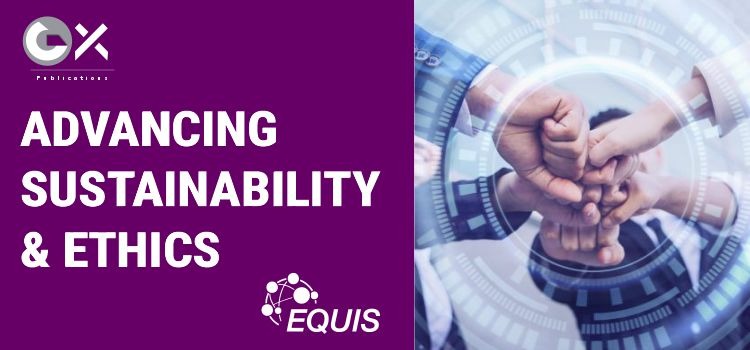
Business schools train the leaders of tomorrow. But leadership is not just about profit. Making ethical decisions that benefit both people and the environment is another aspect of it. This is where EQUIS (EFMD Quality Improvement System) plays a role.
EQUIS is a global accreditation that recognises business schools for their high standards. It goes beyond academics and also looks at ethics, social responsibility, and sustainability. Schools with EQUIS accreditation focus on teaching business in a way that benefits society.
Today, businesses face pressure to act responsibly. Climate change, fair wages, and ethical decision-making are essential issues. Future leaders must understand how their actions affect workers, communities, and the environment. EQUIS ensures that schools prepare students for these challenges.
This article will explain how EQUIS encourages sustainability and ethical business practices. It will explore its standards, highlight real examples of schools making a difference, and show why this matters for the future of business education.
EQUIS (EFMD Quality Improvement System) is a leading international accreditation for business schools. It is managed by the European Foundation for Management Development (EFMD) and is recognised worldwide. Schools that earn this accreditation meet high academic and professional standards.
What makes EQUIS different is its focus on ethics, social responsibility, and sustainability. Many business accreditations only look at teaching quality and research. EQUIS goes further by ensuring that schools prepare students to be responsible leaders. This means teaching them how businesses can make a profit while also doing what is right for people and the environment.
EQUIS accreditation is not easy to get. Schools must show they provide strong education, global exposure, and a commitment to ethical business practices. They must also have strong connections with businesses and organisations to give students real-world learning experiences.
Why does this matter? Businesses today face pressure to act responsibly. They need leaders who understand ethical decision-making and sustainable practices. EQUIS-accredited schools help meet this demand by shaping graduates who think beyond short-term profits.
For students, choosing an EQUIS-accredited school means getting an education that prepares them for the future. They learn from institutions that focus on high-quality teaching, global perspectives, and business practices that make a difference.
EQUIS sets high standards for business schools. It does not just focus on academics but also looks at how schools teach ethics and sustainability. Schools that want EQUIS accreditation must show that they prepare students to make responsible decisions in business.
One key requirement is a strong focus on ethics. EQUIS expects schools to include courses on fair business practices, corporate responsibility, and moral decision-making. Students should learn how businesses can grow without harming people or the environment.
Sustainability is another critical area. EQUIS wants schools to teach students how companies can reduce waste, lower pollution, and create eco-friendly products. Schools must also show they follow these values in their operations, such as using green energy or reducing plastic waste on campus.
Research is also a big part of EQUIS standards. Schools must support studies on ethical business and sustainability. This helps develop new ideas that businesses can use to improve their practices.
Business schools must also work with real companies to teach students about responsible business. EQUIS looks for schools that partner with businesses that follow ethical and sustainable practices.
By setting these standards, EQUIS helps create a future where business leaders think about more than just profits. They learn to run companies in ways that are fair, honest, and good for the planet.
Many EQUIS-accredited business schools are setting an example by making sustainability a core part of their programs. Here are some that stand out:
1. Rotterdam School of Management (RSM), NetherlandsThese schools show that sustainability is not just a topic in textbooks. They actively prepare students to run businesses that balance profit with responsibility. EQUIS accreditation ensures that more schools follow these examples.
Businesses are under more pressure than ever to act responsibly. Customers, employees, and investors now expect companies to focus on more than just profit. They want businesses to be fair, honest, and reasonable for the environment. This has increased the need for ethical business leaders.
1. Customers Expect ResponsibilityBusiness schools must prepare students for this shift. EQUIS-accredited schools focus on teaching ethics and sustainability, making sure future leaders can run businesses that succeed while doing the right thing.
Business education is changing. Companies want leaders who understand ethics, sustainability, and global challenges. EQUIS accreditation helps business schools prepare students for this future.
1. Stronger Focus on Ethics and SustainabilityThe future of business education is clear. Schools that meet EQUIS standards will shape leaders who run businesses responsibly while driving long-term success.
EQUIS accreditation is shaping the future of business education. It ensures that schools go beyond teaching profit-making and focus on ethics, sustainability, and responsible leadership.
Businesses today need leaders who understand social and environmental challenges. EQUIS-accredited schools prepare students for this by offering real-world learning, global exposure, and courses that emphasise fairness and sustainability.
The demand for ethical business practices will only grow. Companies, investors, and customers expect businesses to do what is right, not just what is profitable. EQUIS helps create a new generation of business leaders who can meet these expectations.
As more schools adopt EQUIS standards, business education will continue to improve. This shift will lead to more substantial companies, better workplaces, and a more responsible way of doing business.
No comments yet. Be the first to comment!
Your email address will not be published. Required fields are marked *